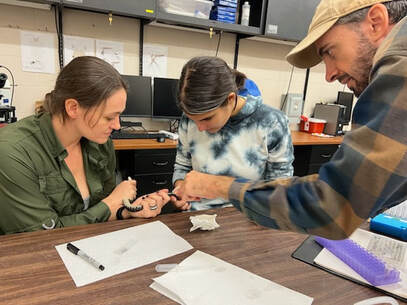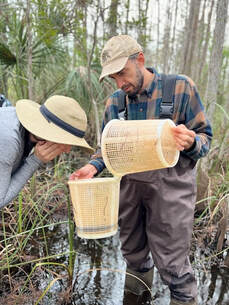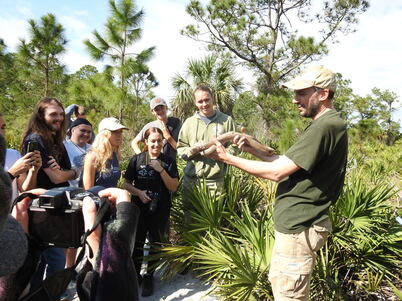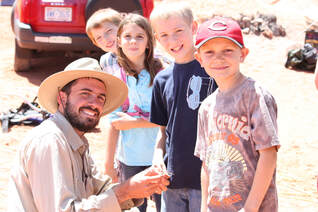 Photo by Marilize van der Walt
Photo by Marilize van der Walt
Courses Taught
- Reptile & Amphibian Evolution/Herpetology (Florida Gulf Coast University)
- Ornithology (Florida Gulf Coast University)
- Scientific Process (Florida Gulf Coast University)
- Biology I (Florida Gulf Coast University)
- General Ecology (Florida Gulf Coast University)
- Advanced English for Scientists (Max Planck Institute for Chemical Ecology)
- Biodiversity of Utah (Department of Biology, Utah State University)
- Herpetology of the Southwest (American Museum of Natural History Southwestern Research Station)
- Biology I & II (lab; Department of Biology, Utah State University)
- Evolution (Fall 2013, 2014)
- Ornithology (Spring 2013, 2014)
- Herpetology (Spring 2011)
- Animal Diversity (lab; Fall 2009, Spring 2010)
- Functional Comparative Vertebrate Anatomy (lab; Spring 2010)
- Vertebrate Natural History (Fall 2009, 2010)
- General Biology (lab; Fall 2009)
- Population Ecology (Fall 2008)
- Ichthyology (Spring 2009)
- Herpetology (Spring 2007, 2008)
- Reptile Anatomy and Physiology – Anatomy and Physiology of Animals
- Microbes & the Immune System – General Microbiology (2 years)
- Biodiversity of Birds – Biology and the Citizen
- Comparative Immunology of Animals – Comparative Animal Physiology
- Nutrition, Feeding, & Metabolism – Comparative Animal Physiology (2 years)
- Avian Evolution – Ornithology (2 years)
- Tetrapod Evolution – Vertebrate Natural History
- Inventory & Monitoring of Amphibians & Reptiles – Wildlife Ecology & Identification
- Living with Snakes – Living with Wildlife (4 years + 2 summer semesters)
- The Only Good Snake is a Live Snake – Honors Seminar (2 years)
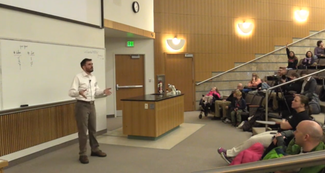 You can watch a talk I gave for the USU Science Unwrapped seminar series here!
You can watch a talk I gave for the USU Science Unwrapped seminar series here!
Teaching Philosophy
My approach to teaching has evolved from outreach programs I led for elementary school classes when I was 12 or 13 years old through my formative experiences as an undergraduate teaching assistant at the University of Georgia, to advanced courses in scientific writing for adult ESL speakers. I have taught using diverse curricula in several disciplines, from non-majors courses to advanced field and laboratory courses. I think my approach to science is accessible and can equip young scientists to succeed in a variety of careers both in and outside of science. Whenever possible, I try to highlight my own past & present knowledge gains so that my students see us as peers. Becoming an expert in a field often makes teaching that material difficult, because you have forgotten the difficulties of a beginning learner. Because I have been teaching from a young age, I have a good memory for common pitfalls & how best to learn from them.
The Utah State University College of Science awarded me with their Graduate Teacher of the Year Award in 2015
My approach to teaching has evolved from outreach programs I led for elementary school classes when I was 12 or 13 years old through my formative experiences as an undergraduate teaching assistant at the University of Georgia, to advanced courses in scientific writing for adult ESL speakers. I have taught using diverse curricula in several disciplines, from non-majors courses to advanced field and laboratory courses. I think my approach to science is accessible and can equip young scientists to succeed in a variety of careers both in and outside of science. Whenever possible, I try to highlight my own past & present knowledge gains so that my students see us as peers. Becoming an expert in a field often makes teaching that material difficult, because you have forgotten the difficulties of a beginning learner. Because I have been teaching from a young age, I have a good memory for common pitfalls & how best to learn from them.
The Utah State University College of Science awarded me with their Graduate Teacher of the Year Award in 2015
